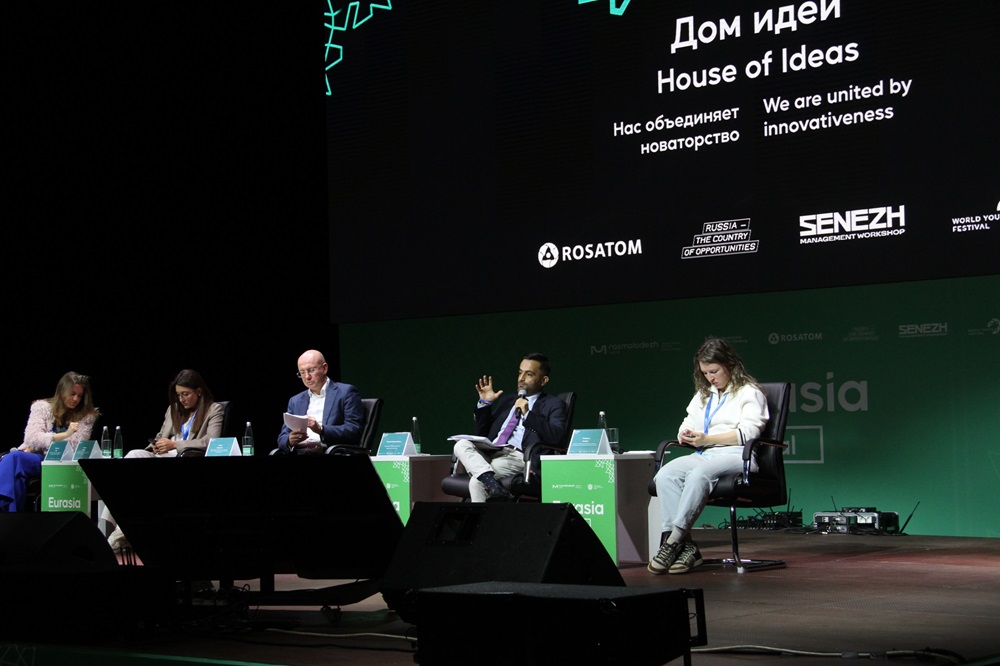
Written by: Tehzeeb Hussain Bercha
Posted on: October 09, 2024 |  | 中文
| 中文
The writer (first row, third from right) with other participants
The third day of the forum was particularly significant for me, as I was scheduled to speak during the morning session titled "ALL OVER THE WORLD: The Best Humanitarian International Projects." This session, moderated by Julia Motyakina, Head of the International Cooperation Department of ANO "DVFM," included several prominent figures such as Alexander Alimov from the Russian Ministry of Foreign Affairs and Victoria Karslieva, Deputy Executive Director of the Gorchakov Fund and Svetlana Vorobyova, Deputy Director of the Department of Expert-Analytical and International Activities of the Russian Geographical Society.
In my speech, I drew from my personal journey and experiences with international relations, particularly the complex dynamics between Pakistan, Afghanistan and Russia. I emphasized Russia's pragmatic approach to regional stability, contrasting it with the often-disruptive interventions of Western nations. I spoke about the Central Asia-South Asia power project (CASA-1000) and Russia’s critical role in cultural and scientific exchanges with Pakistan, particularly in Afghanistan’s post-war reconstruction efforts. It was a privilege to represent my think tank, the Pakistan-China Institute, at such a high-level forum.

The writer is delivering his speech during the session titled "ALL OVER THE WORLD_ The Best Humanitarian International Projects."
My talk was well-received, and I felt proud to be part of this global dialogue. It was also a great honor that, while I spoke in Orenburg, my boss, Senator Mushahid Hussain Sayed, Chairman of the Pakistan-China Institute, was giving a keynote address at the BRICS Seminar in Moscow. His words echoed the sentiment of transformation sweeping through South Asia, as countries like Pakistan seek to reject the status quo in favor of more equitable international relations.
No journey is complete without indulging in the local cuisine, and after three days of sampling Russia’s mild yet flavorful dishes, my colleagues from Pakistan, Nasir Sheikh, Izaz Ali Khan and I decided to go in search of something spicier. Our search led us to an Uzbek restaurant, recommended by an Afghan taxi driver who had lived in Orenburg for the past 20 years. He spoke in Urdu, sharing fond memories of his time in Islamabad and Rawalpindi. The restaurant, clean and welcoming, offered a delicious plate of beef biryani. We also ordered Chinese dumplings (mumto), and the flavors were so incredible that I still struggle to do justice to their description.
The final days of the forum focused on youth collaboration across BRICS countries and media strategies for promoting international friendship clubs. On the last night, our Russian hosts organized a farewell party, where we enjoyed Russian pickles, packaged foods and chocolates. I was struck by the warmth and kindness of the young Russian women in our group, particularly Anastasia Malyutina, our group leader. Despite her youth, she displayed a maturity and responsibility far beyond her years, ensuring that every group member was taken care of during our stay. I observed that Russian women possess not only physical beauty but also hearts of exceptional kindness. They are confident, dignified, responsible and caring, embodying qualities that are truly admirable. Anastasia's warm embrace and heartfelt well-wishes on the morning of my departure from Orenburg stand as one of the most unforgettable memories of my life.
As my time in Orenburg drew to a close, I took a moment to visit the Eurasia Bridge, a symbolic site that marks the connection between Europe and Asia. The Ural River, which flows beneath the bridge, holds a quiet beauty. The autumn scenery along its banks reminded me of my childhood in Gilgit, and as I cycled along the river with my Russian friends, I felt an overwhelming sense of peace and nostalgia.
I was particularly touched by the hospitality and friendliness of the Russian people, especially the younger generation. Despite the language barrier, their eagerness to connect, intelligence and their respect for others made a lasting impression on me. With English education now compulsory in Russian schools, I am confident that future generations will continue to build bridges of understanding with the world.
On my final day in Russia, I found myself back in Moscow, thanks to a short flight from Orenburg. With nearly ten hours before my connecting flight, I was fortunate to be hosted by Mr. Victor Khrustalev, Deputy to the Chair of the Moscow Chamber of Commerce and Ms. Inga Koryangina, a professor at the Plekhanov Russian University of Economics (PRUE), Moscow. She welcomed me warmly and took me on a tour of Moscow’s iconic landmarks.

The writer with Ms. Inga Koryangina, a professor at the Plekhanov Russian University of Economics (PRUE), Moscow.
The Kremlin, Red Square, and the awe-inspiring St. Basil’s Cathedral were just a few of the stops on our tour. The blend of historical and modern architecture in Moscow was captivating, and I felt as though I was walking through a living history book. We ended our day at a local restaurant, where I had the opportunity to taste authentic Russian cuisine: borscht, herring appetizer and blini, rich in flavor and heritage.
As I boarded my flight from Moscow to Abu Dhabi, I reflected on the rich experience of the past week. The journey had been about more than just attending a forum; it had been an opportunity to build lasting friendships, explore new cultures, and broaden my understanding of the world. By the time I arrived back in Islamabad, I was filled with a deep sense of gratitude for the memories I had made in Russia.
In retrospect, this journey was about more than the eight days I spent in Russia, for it was about the connections formed, the stories shared and the cultural exchange that will stay with me for years to come.
You may also like: